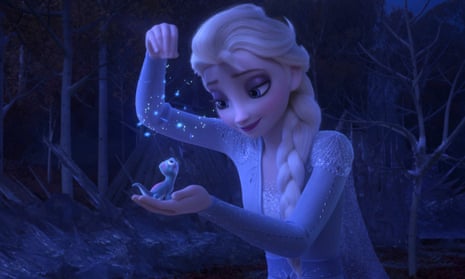When I was pregnant with my daughter, I naively imagined that I would soon have a small person I could completely mould. I imagined us having all the same interests and being able to guide her in choosing fun and interesting hobbies.
And then I gave birth to this tiny person who, from the minute she was born three weeks earlier than expected, had her own ideas about when and how she would do things. Eventually I came to realise that as much as I believed I would hold this incredible sway over her tastes and interests, many times she is the one influencing me.
Nowhere is this more apparent than with the Disney phenomenon Frozen. When my daughter was younger, I smugly judged other parents at playgrounds as their daughters struggled to climb up the stairs to the slide, tripping on the hem of their Elsa dresses. I proudly told everyone that we had never seen Frozen, that my daughter didn’t even know who Olaf the snowman was.
But Frozen is so much a part of the collective consciousness of today’s children that slowly she started coming home from childcare with snippets of knowledge about Elsa and Anna until, before I knew it, Frozen was intimately woven into the fabric of our lives.
First there was a snowflake-shaped dinner plate, then a colouring book, closely followed by pyjamas. And then a neighbour brought over a hand-me-down Elsa dress and the whole, terrible thing was complete. We were as good as citizens of Arendelle, and Queen Elsa was our benevolent dictator.
Falling in love with Frozen was a journey that I didn’t even realise I was undertaking. It crept up on me slowly, but when I discovered I was willing to spend an entire three-hour car trip between Sydney and Canberra listening to the soundtrack on repeat, and when I hit play on the movie for the 46th time and didn’t start screaming, I realised – if this isn’t love, what is?
With the sequel having just come out I’ve found myself seeking out new trailers and watching them even when my daughter isn’t around. I madly refreshed the page to get us tickets to the Broadway musical adaptation of the movie when it comes to town next year. And as much as I tell myself that this is all about connecting with my daughter, the truth is that it has become part of who I am too.
I realised my initial resistance had been this innate belief that to raise a feminist daughter, I had to raise a tomboy who eschewed the traditionally feminine notions of princesses in flowing ball gowns. I’ve since come to understand the power in femininity.
When Elsa reaches the North Mountain, she can finally stop bottling up all the powers that she is too afraid to use for fear of hurting someone. So she builds herself a giant ice castle that’s a bit of an engineering marvel in itself, but she also makes a brand new sparkly dress. Cynics may tell us that’s as much about merchandising opportunities as it is about displaying powerful femininity, but I’m choosing to see it my way.
At a time when society celebrates little girls who play with trucks and women are told to “lean in”, there’s the old ingrained belief that traditionally masculine interests and pursuits are inherently more serious and noteworthy than traditionally feminine things.
For a long time, I didn’t get it, but my daughter did. She feels powerful in a tutu because no one has ever told her that people who wear tutus aren’t powerful. She runs faster in sparkly ballet flats than she does in Nikes because she feels cool and unstoppable.
There’s a moment in the original movie when Queen Elsa tells her more impulsive younger sister “You can’t marry a man you just met!” Unprompted, my daughter will now come out with this line every time she encounters a traditional fairytale where there is love (and marriage) at first sight. It’s not groundbreaking activism, but it has taught her to look at stories more critically and challenge traditions.
Naturally no Disney movie is without its problematic elements. From removing female characters from source material The Snow Queen in the adaptation to the fact that its protagonists are white, thin and royal, it’s hardly breaking down great societal barriers. On the other hand, Jordan Peterson thinks it’s “deeply propagandistic”, so it’s at least doing something right.
I never expected to fall in love with Frozen, but in doing so I’ve learnt a lot about myself. While I’m not about to let it become a guidebook for life for me or my daughter, it has taught me, among other things, that sometimes you just need to let it go.
Megan Maurice is the co-author of Shine: The Making of the Australian Netball Diamonds and has been covering netball for more than a decade

_(ef04def6065c81ceb7d81c967f1e2095c2d32a4d).png?width=180&dpr=1&s=none)